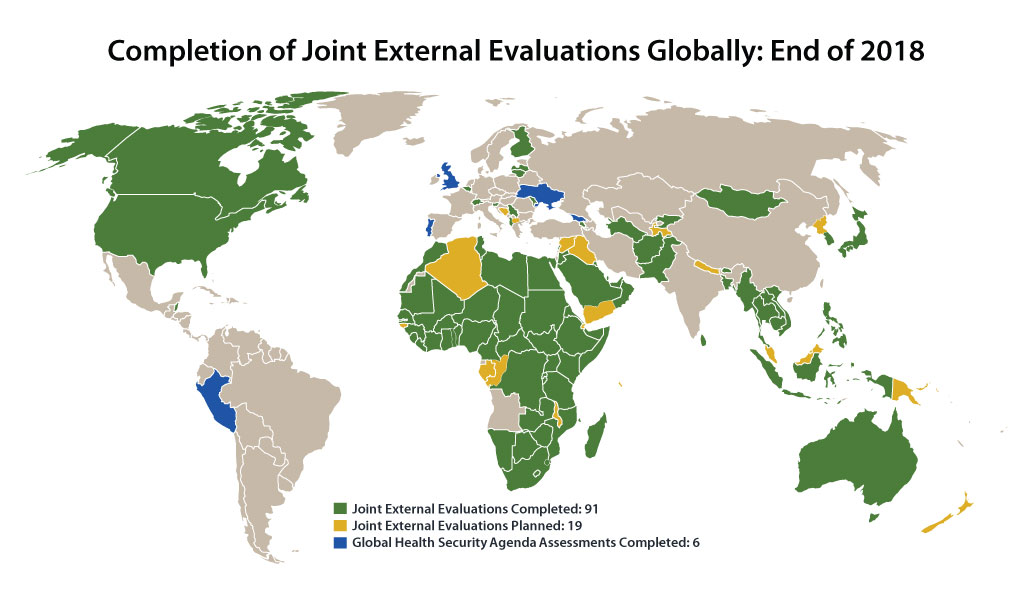Joint External Evaluations (JEE) for Improved Health Security
‹View Table of Contents
The WHO’s Joint External Evaluation (JEE) helps countries assess their health security strengths and weaknesses to direct resources toward the most urgent needs, protecting the country and the rest of the world from infectious diseases. JEEs are voluntary, external assessments of a country’s ability to prevent, detect, and respond to infectious diseases and other public health threats. The JEE process brings together experts from around the world to work with a country to assess its strengths and weaknesses and make recommendations to improve health security capacity. Following a JEE, countries are aware of their gaps in health security capacity and can take action to build these capabilities. One way to move toward increased capabilities is to develop National Action Plans for Health Security (NAPHS), which identify the resources and define the actions needed to address the gaps identified by the JEE. Countries can also select high priority actions identified in the JEE and begin implementation immediately. WHO’s IHR Benchmarks tool can guide countries in identifying appropriate actions to take to improve capacity in each of the JEE technical areas.
CDC is a world leader in building health security capacity and CDC support to the JEE and national action planning process encourages countries to take action to address gaps in health security that could result in the spread of infectious diseases internationally, including to the United States. At the end of 2018, 91 countries had completed JEEs and more than 45 countries had completed or started a NAPHS. Sixteen of 17 of CDC’s Phase 1 partners completed and published a JEE and 15 of 17 started or completed a NAPHS.
Completion of Joint External Evaluations Globally: End of 2018

World map depicting countries that have completed Joint External Evaluations (91), planned for Joint External Evaluations (19), or completed Global Health Security Agenda Assessments (6), shaded by category of each.
CDC has been critical to the success of the JEE and national action planning by:
Facilitating global implementation. CDC collaborated with WHO to develop materials necessary for implementing the JEE, including (1) training materials to prepare JEE evaluators and JEE team leads, (2) guidance for countries preparing for the JEE and for evaluators to successfully perform the assessments, and (3) tools that allow WHO to implement and oversee JEE implementation worldwide.
Leveraging CDC’s world-class expertise. CDC supports JEEs through on-the-ground assistance from in-country staff for country self-assessment and participation of CDC external experts on JEE teams. CDC experts have participated as members of JEE teams in 60% of the 91 JEEs completed by the end of 2018.
Building a better external evaluation process. CDC has improved the external evaluation process by contributing to the development of the original JEE and its training tools, as well as by incorporating lessons learned into the second version of the JEE tool. JEE 2.0 was published in January 2018 and is now available in English, French, Spanish, and Russian.
Support to the JEEs and national action planning has amplified CDC’s efforts to build global health security capacity by:
- Providing valuable information on countries’ gaps in health security capacity
- Allowing CDC programs to target efforts to make the largest impact
- Identifying countries’ gaps for support from other international organizations or donor countries
- Elevating the need for countries to support health security capacity domestically through an all-of-government approach
CDC has been critical to the success of Joint External Evaluations. At the end of 2018, 91 countries had assessed their health security strengths and weaknesses, and more than 45 countries started or completed a National Action Plan for Health Security. #globalhealthsecurity